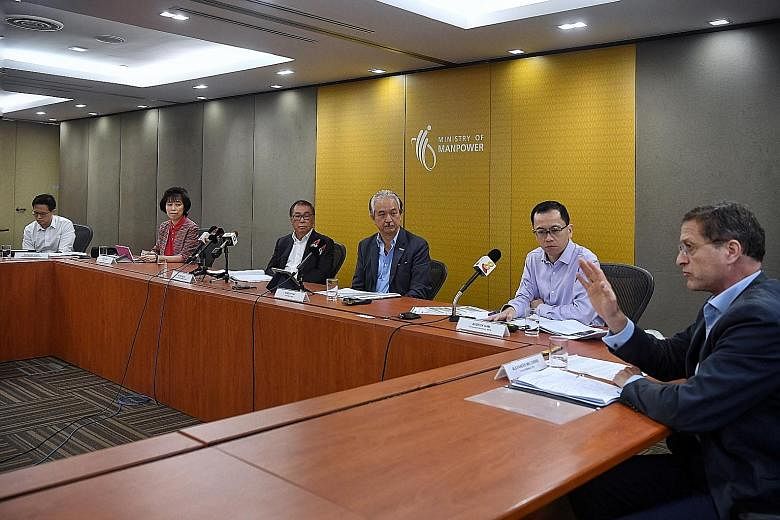The National Wages Council (NWC) has renewed its call for employers to implement the flexible wage system comprising a fixed basic wage together with monthly and annual variable components.
It can act as a "shock absorber" in downturns, said Singapore National Employers Federation president Robert Yap, a council member.
"As we go on, there will be actually a lot of shocks, a lot of changes, a lot of other kinds of crises along the way, and if we prepare ourselves well with the (flexible wage system) properly implemented, it will help us to cushion the impact," he said at a press conference yesterday on the council's updated annual wage guidelines.
Permanent Secretary for Manpower Aubeck Kam said the system provides employees with some certainty when managing their expenses as they know how much could potentially be adjusted, while National Trades Union Congress president Mary Liew stressed that the system is not just for wage cuts, but also for companies to reward employees when the companies perform well. Both Mr Kam and Ms Liew are also NWC members.
Under the system, the recommended monthly variable component for rank-and-file workers is 10 per cent, while the annual variable component should be 20 per cent, making up a total of 30 per cent of the wage package.
The total variable component should be 40 per cent for middle management and 50 per cent for senior management.
Last year, only 29.3 per cent of employees were under this flexible wage system, although in the last few years, about nine in 10 private-sector employees were in companies with some form of flexibility in their pay structures.
The system was first introduced in 1986, after the 1985 recession, with an annual variable component, but in 1999, after the Asian financial crisis, the council recommended including a monthly variable component to allow businesses to react more quickly to changing business conditions.
The low take-up rate could be due to many multinational corporations following global salary systems, said Mr Alexander Melchers, an NWC member and Singaporean-German Chamber of Industry and Commerce council member.
Very small businesses mostly do not have human resource departments to implement changes to wage systems, he added.
Mr Kam noted, though, that it is possible for small firms to come on board as HR technology improves.
Yesterday, the NWC recommended that if wage cuts are necessary to minimise retrenchments, employers should first adjust the flexible portions of the wage package.
Those that have not adopted the flexible wage system can cut wages to keep the business going, but treat any wage cuts as adjustments to a new variable component and immediately implement the system.
"Any wage cuts implemented should be fair and reasonable, bearing in mind that employees will still have basic expenses to upkeep," said the council.
Employers should also take into account sector and company performance, government support and prior cost-saving measures already affecting employees.
Mr Melchers noted that in reco-mmending temporary wage cuts where necessary, the council has not chosen the easiest path. In some other countries, multinational corporations will just cut headcount by say, 30 per cent, to save costs.
For the first time, the NWC also made recommendations on supporting self-employed people. It said that service buyers and intermediaries should avoid cancelling projects where possible, and provide advance or timely partial payments for work done or costs incurred for projects deferred or interrupted by Covid-19.
It said that previously agreed progressive wage model increments, which set minimum pay levels along career and skills ladders in the cleaning, security and landscaping industries, should continue.
The council decided against a reduction in employers' contributions to the Central Provident Fund (CPF) as it would disproportionately affect local employees, said Mr Kam.
Cutting employer CPF contributions would also be a blunt move that would not take into account the significant variation in circumstances across sectors and firms, he added.
-
An example of how the flexible system works
-
Before the Covid-19 pandemic, a worker earned a basic monthly wage of $2,000, with an annual bonus of two months.
But during the pandemic, his basic monthly wage was reduced by 5 per cent to $1,900, with no change in his annual bonus.
At this time, his employer has yet to implement the flexible wage system (FWS). Under the updated National Wages Council guidelines, the employer should implement the FWS immediately.
This means that the 5 per cent reduction of the worker's basic monthly pay, or $100, will be taken as a new monthly variable component (MVC), while his annual bonus of two months will be taken as the new annual variable component (AVC).
When the Covid-19 situation eases and the business recovers, the employer can then restore the worker's MVC of $100.
The employer can increase the MVC later either through a transfer of part of basic wages, or through future wage increases.
For rank-and-file workers, the recommended wage structure under FWS is 70 per cent basic monthly wage, 10 per cent MVC and 20 per cent AVC.
For middle management, the monthly and annual variable components should make up about 40 per cent of total wages, while basic monthly wages make up about 60 per cent. For senior management, the recommended ratio is 50:50.
Meanwhile, the worker's AVC quantum should be based on clear key performance indicators. The employer should continue to build up the AVC to the recommended proportions through future wage increases.
Charmaine Ng


